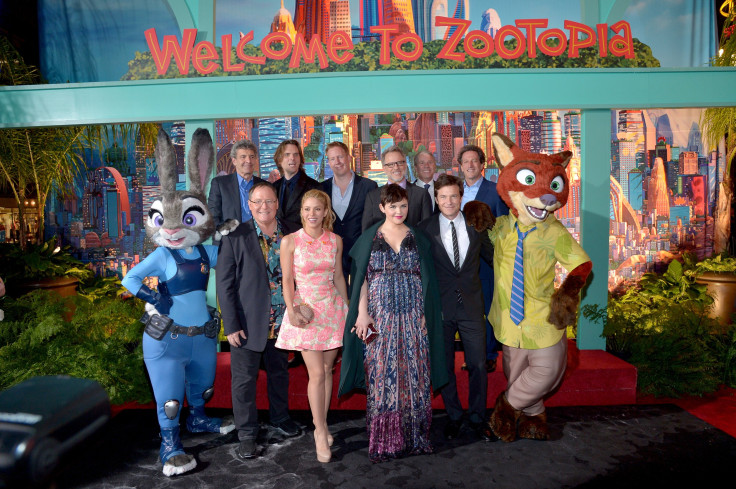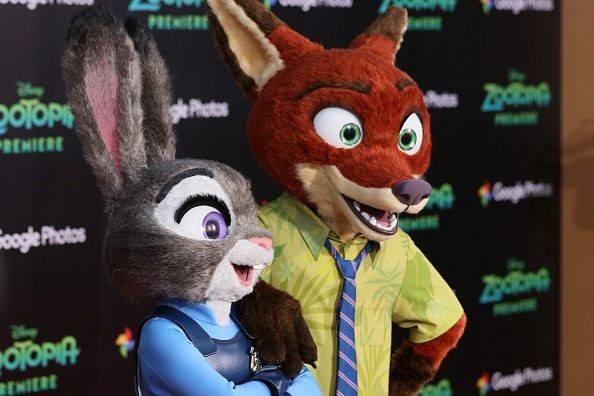Why ‘Zootopia’ Means Hollywood Animators Might Want To Start Learning Chinese

LOS ANGELES — China’s box office may be growing at a rate that would make mobile delivery startups jealous, but plenty of studios and production companies making movies for that market still want to go back the drawing board. The animated one.
As China prepares to become the world’s biggest box office as soon as 2017 — jumping nearly 50 percent just last year — Hollywood studios are eager to find films that play well in the Middle Kingdom. That’s particularly important given the fact that only 34 foreign films are cleared by the country’s censors each year, so each import has to count. And lately, Hollywood has underperformed.
“Star Wars: The Force Awakens” put Chinese audiences to sleep, according to Jonathan Papish, an analyst for China Film Insider, and the American film industry’s typically sleepy early-season slate hasn’t made much of a splash. Just 14 percent of China’s box-office returns to date comes from American films. That’s skewed by the fact that its high season, Chinese New Year, comes in February — and its film censors restrict the country’s screens during the holiday to local fare.
Still, “Furious 7” was the last American movie to really be a massive hit in China, eventually making more than $390 million — but it was released 11 months ago. “The Martian,” which got plenty of Oscar buzz and a big marketing campaign in China, made about $95 million. But Hollywood has found some gold in cartoons, and China’s studios are starting to follow in that path. “Kung Fu Panda 3,” a co-production of several Chinese companies and DreamWorks, quickly became China’s biggest-ever animated film, despite what looks like a missed opportunity with a too-early release.
But Disney’s “Zootopia” — already a smash hit in the U.S., making nearly $144 million in 11 days since it was released — has blown the black-and-white bear out of the water even in its natural habitat. This weekend, the film reeled in nearly $58 million — more than doubling its opening-weekend take — and both Saturday and Sunday were the two biggest days ever in China for an animated film, China Film Insider reported. The movie has already made nearly $113 million in China, putting it on track to knock off “Kung Fu Panda 3” and become the highest-grossing animated film ever released in the country. A heavier family moviegoing crowd around Chinese New Year likely helped, and the film also played well in China’s secondary and tertiary cities, where new multiplexes have popped up frequently in the last few years.
Chinese companies are loath to leave all the spoils to American studios, and fitting a larger industry trend, they’re going after Hollywood pros. Huayi Bros. Media Corp., a Chinese company that agreed last year to co-finance a slate of 18 movies with STX Entertainment, just brought over former DreamWorks and Fox executive Joe Aguilar to head an animation division, and is expected to add more Tinseltown talent.

For what it’s worth, it’s really hard to make a movie that resonates with both Chinese audiences and American audiences. “The Mermaid,” the biggest-ever movie in China with more than $500 million in box-office receipts, reeled in a surprisingly strong $3 million in a very limited U.S. release — peaking at just 106 screens — which reveals the low expectations cinema chains had. And for good reason: “Monster Hunt,” the previous Chinese box-office champion, did just $33,000 in the U.S.
The “Fast and Furious” franchise is not known for its profound dialogue or character development, but its most recent installment, “Furious 7,” was wildly popular in China. Its high-octane action sequences and higher-octane supercars — popular among the upper-middle-class youngsters that make up a good part of China’s moviegoing public — certainly helped, but the movie’s protagonist, former cop turned criminal Brian O’Conner, who was played by the late Paul Walker, also had a lot of appeal, said Bennett Pozil, an executive vice president at East West Bank who led the financing for the Huayi Bros.-STX deal, among other Chinese-American co-productions.
“What I noticed firsthand is how a lot of young Chinese identified with Paul Walker,” Pozil told International Business Times.
Walker aside, “Furious 7” transported Chinese audiences into a fantasy world — race cars, helicopter chases, Abu Dhabi skyscrapers — without a script or storyline that required too much nuance or knowledge of American cultural references. And while “Zootopia” has been praised for its plot and message of inclusiveness — the film’s boffo reviews in China likely helped its cause — it’s still easy to follow. Animation can also make a film appear homegrown even when it’s not — “Kung Fu Panda 3” had a Mandarin-language version with separate facial expressions to avoid the disconnect that can come with dubbing. China’s film companies want to expand their influence on screens outside their home country, and not much travels better than cartoons. Hollywood animators might soon have a lot more leverage.
© Copyright IBTimes 2025. All rights reserved.





















